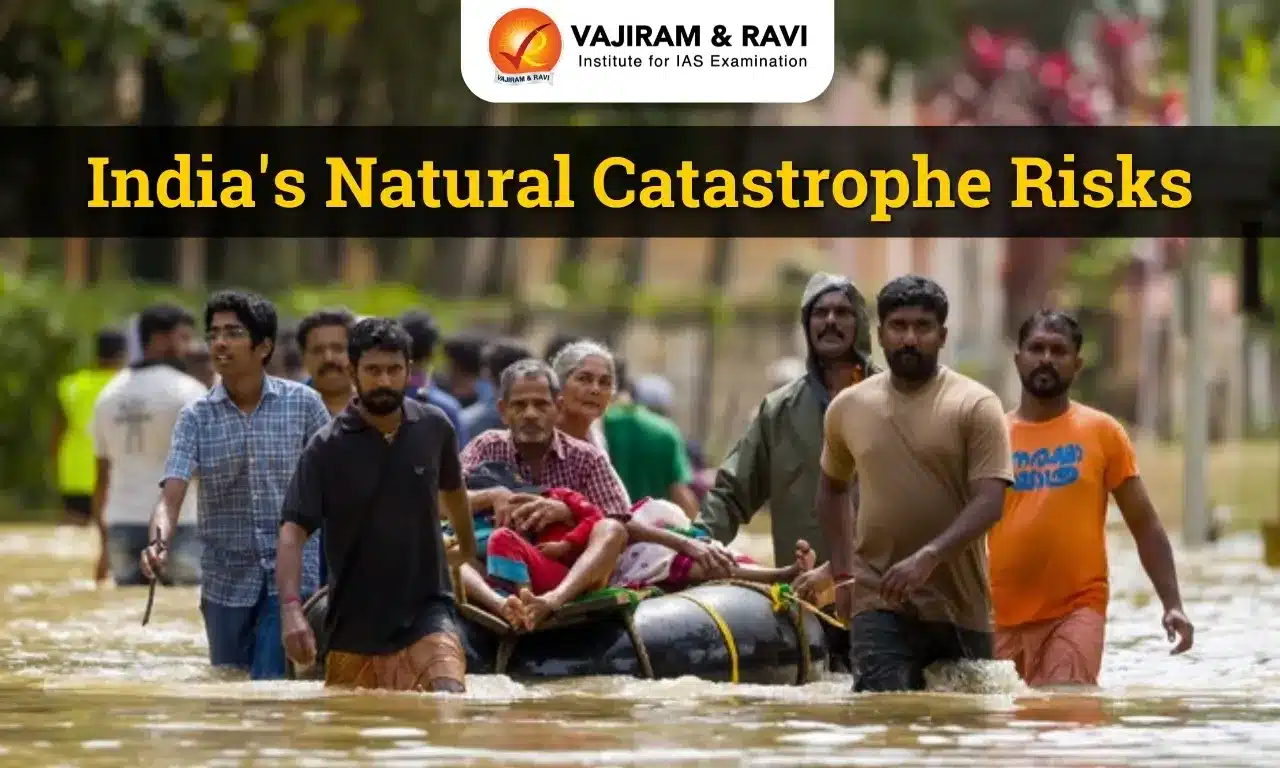What’s in today’s article?
- Background
- Key Events in 2023
- India’s Unique Vulnerabilities
- Earthquake Risks
- Challenges in Resilience and Insurance
- Building Resilience: A Three-Step Approach
- Conclusion
Background
- India has witnessed a sharp rise in economic losses due to natural catastrophes, reflecting both the increasing frequency of extreme weather events and the country’s vulnerabilities.
- In 2023, natural disasters caused an estimated $12 billion in economic losses, significantly exceeding the annual average of $8 billion over the past decade, according to a report by global insurance giant Swiss Re.
Key Events in 2023
- Floods in Northern India and Sikkim (July 2023):
- Affected Areas: Himachal Pradesh, including Shimla, and Delhi.
- Impact: Caused extensive damage due to heavy rains between July 10-15, disrupting daily life and infrastructure.
- Tropical Cyclone Biparjoy (June 2023):
- Landfall: Category 3 cyclone struck Kutch, Gujarat, impacting Maharashtra and Rajasthan as well.
- Damage: Shut down major ports like Kandla and Mundra, causing extensive damage due to strong winds, heavy rainfall, and storm surges.
- Tropical Cyclone Michaung (December 2023):
- Landfall: Hit Chennai, Tamil Nadu.
- Impact: Brought extreme rainfall, resulting in significant economic losses and urban disruption.
India’s Unique Vulnerabilities
- Monsoon-Driven Floods:
- Contribution to Losses: Over the past two decades, floods have accounted for an average of 63% of annual economic losses.
- Monsoon Influence: India’s geography and climate expose it to heavy rainfall during:
- Summer Monsoon (June-September): Causes severe flooding, as seen in Kerala (2018) and Uttarakhand (2013).
- Northeast Monsoon (October-December): Responsible for floods like Chennai (2015).
- Economic and Industrial Exposure:
- States like Gujarat, Maharashtra, and Tamil Nadu are highly industrialized, contributing 36.8% of India’s total industrial output. These states also face heightened risks:
- Gujarat: Prone to floods, tropical cyclones, and earthquakes.
- Maharashtra: Susceptible to floods and cyclones, especially in Mumbai.
- Tamil Nadu: Regularly impacted by monsoon floods and cyclones, particularly in Chennai.
Earthquake Risks
- Urban centres like Delhi and Ahmedabad face significant earthquake hazards.
- A major earthquake in the Himalayas or near urban centres like Mumbai could result in catastrophic losses, potentially surpassing the devastation caused by the 2001 Bhuj earthquake in Gujarat.
Challenges in Resilience and Insurance
- Despite the scale of economic losses, underinsurance remains a critical issue:
- Protection Gaps: Over 90% of households and businesses are under- or uninsured, leaving them financially vulnerable.
- Costliest Flood Events:
- Mumbai floods (2005): Losses of $5.3 billion (2024 prices)
- Chennai floods (2015): Losses of $6.6 billion (2024 prices)
Building Resilience: A Three-Step Approach
- Swiss Re outlines a strategic framework to address underinsurance and reduce the impact of natural catastrophes:
- Hotspot Identification:
- Identify regions most prone to disasters using granular data.
- Prioritize mitigation measures in high-risk areas like Ahmedabad, Mumbai, and Chennai.
- Risk Assessment:
- Employ advanced models to assess potential exposure and risk accumulation.
- Incorporate recent and detailed data for accurate evaluations.
- Reinsurance Solutions:
- Design targeted reinsurance programs to close protection gaps.
- Promote affordable insurance coverage for households and businesses.
- Hotspot Identification:
Conclusion
- India’s rapid economic growth has outpaced its ability to mitigate the vulnerabilities posed by natural catastrophes.
- The increasing frequency of extreme weather events highlights the urgent need for robust disaster preparedness, improved insurance penetration, and strategic resilience-building measures.
- By addressing these challenges, India can better safeguard its economy and citizens from the mounting risks of natural disasters.
Q1. What is the difference between Floods and Flash Floods?
Flooding is a longer term event than flash flooding: it may last days or weeks. Flash flood: A flood caused by heavy or excessive rainfall in a short period of time, generally less than 6 hours.
Q2. When was NDMA constituted?
In December 2005, the Government of India enacted the Disaster Management Act, which envisaged the creation of National Disaster Management Authority (NDMA), headed by the Prime Minister, and State Disaster Management Authorities (SDMAs) headed by respective Chief Ministers.
Source : IE
Last updated on June, 2025
→ UPSC Notification 2025 was released on 22nd January 2025.
→ UPSC Prelims Result 2025 is out now for the CSE held on 25 May 2025.
→ UPSC Prelims Question Paper 2025 and Unofficial Prelims Answer Key 2025 are available now.
→ UPSC Calendar 2026 is released on 15th May, 2025.
→ The UPSC Vacancy 2025 were released 1129, out of which 979 were for UPSC CSE and remaining 150 are for UPSC IFoS.
→ UPSC Mains 2025 will be conducted on 22nd August 2025.
→ UPSC Prelims 2026 will be conducted on 24th May, 2026 & UPSC Mains 2026 will be conducted on 21st August 2026.
→ The UPSC Selection Process is of 3 stages-Prelims, Mains and Interview.
→ UPSC Result 2024 is released with latest UPSC Marksheet 2024. Check Now!
→ UPSC Toppers List 2024 is released now. Shakti Dubey is UPSC AIR 1 2024 Topper.
→ Also check Best IAS Coaching in Delhi
























